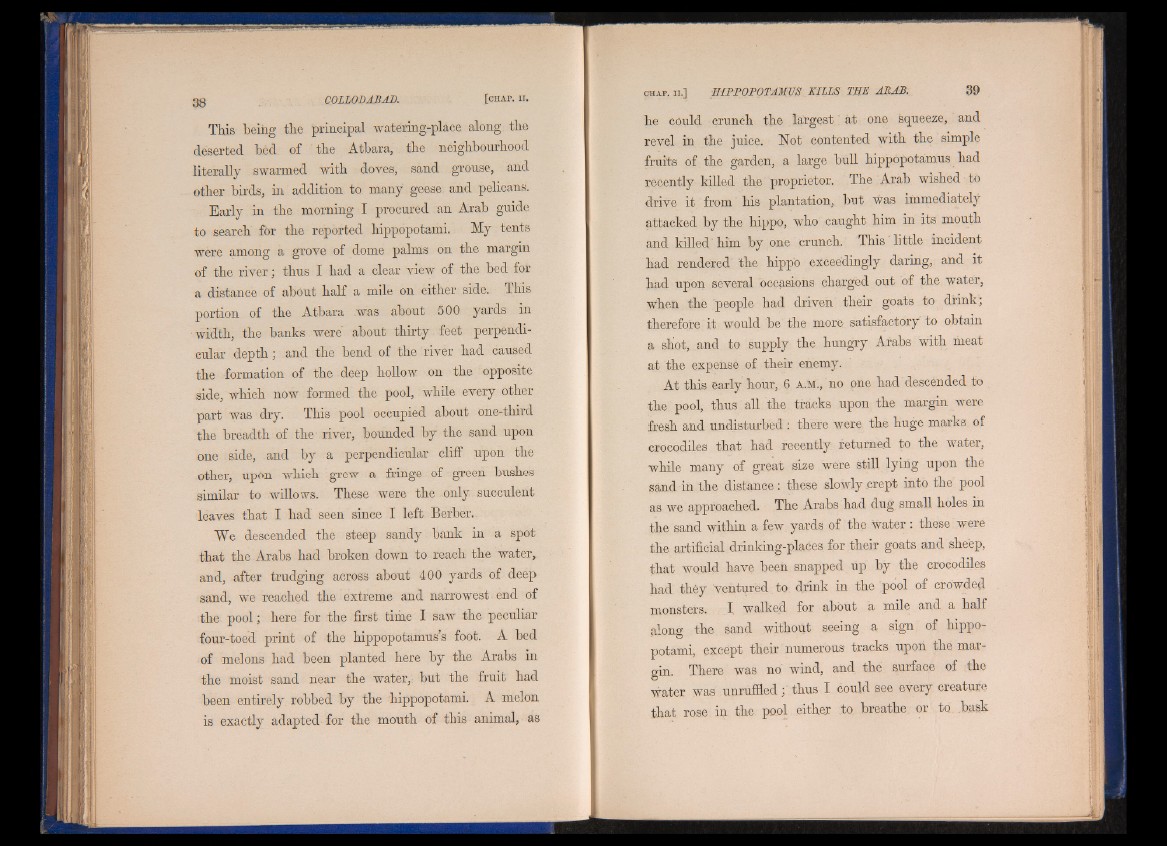
This beiiig the principal watering-place along the
deserted bed of the Atbara, the neighbourhood
literally swarmed with doves, sand grouse, and
other birds, in addition to many geese and pelicans.
Early in the morning I procured an Arab guide
to search for the reported hippopotami. My tents
were among a grove of dome palms on the margin
of the river; thus I had a clear view of the bed for
a distance of about half a mile on either side. This
portion of the Atbara was about 500 yards in
width, the banks I were about thirty feet perpendicular
depth; and the bend of the river had caused
the formation of the deep hollow on the opposite
side, which now formed the pool, while every other
part was dry. This pool occupied about one-third
the breadth of the- river, bounded by the sand upon
one side, and by a perpendicular cliff upon the
other, upon which grew a fringe of green bushes
similar to willows. These were the only succulent
leaves that I had seen since I left Berber.
We descended the steep sandy bank in a spot
that the Arabs had broken down to reach the water,
and, after trudging across about 400 yards of deep
sand, we reached the extreme and narrowest end of
the pool; here for the first time I saw the peculiar
four-toed print of the hippopotamus’s foot. A bed
of melons had been planted here by the Arabs in
the moist sand near the water,: but the fruit had
been entirely, robbed by the hippopotami. A melon
is exactly adapted for the mouth of this animal, as
he could crunch the largest [ at one squeeze, and
revel in the juice. Not contented with the simple
fruits of the garden, a large bull hippopotamus had
recently killed the proprietor. The Arab wished to
drive it from his plantation, but was lmniediately
attacked by the hippo, who caught him in its mouth
and killed him by one crunch. This little incident
had rendered the hippo exceedingly daring, and it
had upon several occasions charged out of the water,
-when the people had driven their goats to drink;
therefore it would be the more satisfactory to obtain
a shot, and to supply the hungry Arabs with meat
at the expense of their enemy.
At this early hour, 6 A.M., no one had descended to
the pool, thus all the tracks upon the margin were
fresh and undisturbed : there were the huge marks of
crocodiles that had recently returned to the water,
while many of great size were still lying upon the
sand in the distance: these slowly .crept into the pool
as we approached. The Arabs had dug small holes in
the sand within a few yards of the water : these were
the artificial drinking-places for their goats and sheep,
that would have been snapped up by the crocodiles
had they ventured to drink in the pool of crowded
monsters. I. walked for about a mde and a half
along the sand without seeing a sign of hippopotami,
except their numerous tracks upon the margin.
There was no wind, and the surface of the
water was unruffled; thus I could see every creature
that rose in the pool either to breathe or to .bask